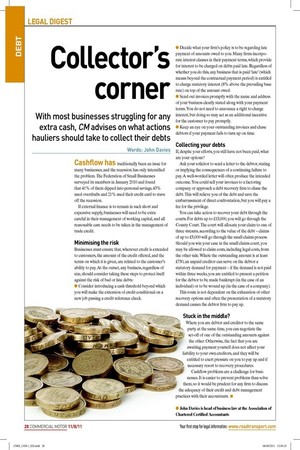Collector’s corner
Page 24

If you've noticed an error in this article please click here to report it so we can fix it.
With most businesses struggling for any extra cash, CM advises on what actions hauliers should take to collect their debts Words: John Davies Cashflow has traditionally been an issue for many businesses, and the recession has only intensiied the problem. The Federation of Small Businesses surveyed its members in January 2010 and found that 41% of them dipped into personal savings, 43% used overdrafts and 21% used their credit card to stave off the recession.
If external inance is to remain in such short and expensive supply, businesses will need to be extra careful in their management of working capital, and all reasonable care needs to be taken in the management of trade credit.
Minimising the risk
Businesses must ensure that, wherever credit is extended to customers, the amount of the credit offered, and the terms on which it is given, are related to the customer’s ability to pay. At the outset, any business, regardless of size, should consider taking these steps to protect itself against the risk of bad or late debts: • Consider introducing a cash threshold beyond which you will make the extension of credit conditional on a new job passing a credit reference check. • Decide what your irm’s policy is to be regarding late payment of amounts owed to you. Many irms incorporate interest clauses in their payment terms, which provide for interest to be charged on debts paid late. Regardless of whether you do this, any business that is paid ‘late’ (which means beyond the contractual payment period) is entitled to charge statutory interest (8% above the prevailing base rate) on top of the amount owed.
• Send out invoices promptly with the name and address of your business clearly stated along with your payment terms. You do not need to announce a right to charge interest, but doing so may act as an additional incentive for the customer to pay promptly.
• Keep an eye on your outstanding invoices and chase debtors if your payment fails to turn up on time.
Collecting your debts
If, despite your efforts, you still have not been paid, what are your options?
Ask your solicitor to send a letter to the debtor, stating or implying the consequences of a continuing failure to pay. A well-worded letter will often produce the intended outcome. You could sell your invoices to a factoring company or approach a debt recovery irm to chase the debt. This will relieve you of the debt and save the embarrassment of direct confrontation, but you will pay a fee for the privilege.
You can take action to recover your debt through the courts. For debts up to £15,000, you will go through the County Court. The court will allocate your claim to one of three streams, according to the value of the debt – claims of up to £5,000 will go through the small claims process. Should you win your case in the small claims court, you may be allowed to claim costs, including legal costs, from the other side. Where the outstanding amount is at least £750, an unpaid creditor can serve on the debtor a statutory demand for payment – if the demand is not paid within three weeks, you are entitled to present a petition for the debtor to be made bankrupt (in the case of an individual) or to be wound up (in the case of a company).
This route is not dependent on the exhaustion of other recovery options and often the presentation of a statutory demand causes the debtor irm to pay up.
Stuck in the middle?
Where you are debtor and creditor to the same party at the same time, you can negotiate the set-off of one of the outstanding amounts against the other. Otherwise, the fact that you are awaiting payment yourself does not affect your liability to your own creditors, and they will be entitled to exert pressure on you to pay up and if necessary resort to recovery procedures.
Cashlow problems are a challenge for businesses. It is easier to prevent problems than solve them, so it would be prudent for any irm to discuss the adequacy of their credit and debt management practices with their accountants. n • John Davies is head of business law at the Association of Chartered Certiied Accountants














































